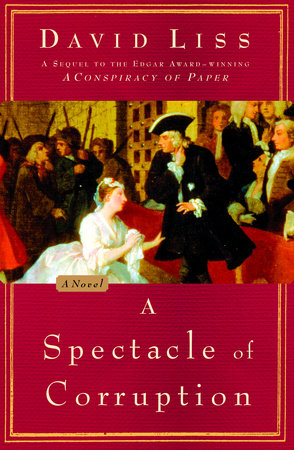A Spectacle of Corruption Reader’s Guide
By David Liss


1. The justice system in the eighteenth century seems outrageously
unjust. No defense attorneys, judges who make a living
through bribes, and shopkeepers who sell evidence. What do you
think will shock readers three hundred years from now about our
justice system?
2. Benjamin Weaver seems to be a mix of brutality and compassion,
the practical and the idealistic. What do you think of his
sense of justice? Do you agree with the decisions he makes of
whom to punish and whom to let go? What do his inconsistencies
tell you about his character?
3. Eighteenth-century parliamentary elections had expensive campaigns,
bribes, and thugs. They attracted the power-hungry and
the greedy, liars and thieves. Is there something inherent about
politics that draws these types of people to it? Is there anything
that can be changed about how campaigns are run that would
minimize corruption?
4. In one fell swoop, Miriam completely reinvented herself. She
converted, married a man from an utterly different background,
and is even called by a different first name. Do you think it is possible
to be happy with so many drastic life changes? Does turning
your back on your heritage have more to do with hating your past
than loving your future? Or is this simply the fulfillment of a lifelong
wish to live the life you believe you were meant to live and
not the one you were born into? Is this ability to reinvent yourself
something with which people in earlier times might have been
more comfortable?
5. When Weaver dresses as Matthew Evans or as a footman he discovers
a whole new world. Is it as easy in today’s world to change
your clothes and dabble in a different world? Can you still walk a
mile in someone else’s shoes? Are social classes today as obvious or
permanent?
6. Weaver keeps expecting to be betrayed by Jonathan Wild, and
is constantly surprised when that doesn’t happen. Is Wild as untrustworthy
as Weaver thinks he is? Does the novel suggest that
there is honor among thieves?
7. There are several incidents of extreme cruelty to animals in the
novel. Dogmill, the most brutal villain, clearly relishes goose pulls
and cockfights, and was apparently responsible for killing Mendes’s
beloved dog. Is there a connection between cruelty to animals and
cruelty to humans? Is Mendes humanized by his love for his pets?
Or is his conduct toward his fellow man worse when juxtaposed
with his ability to display compassion and kindness to animals?
8. Grace Dogmill and Miriam Melbury are very different women,
yet they both refuse to settle into the roles that society would like
to place them in. Are they equally justified in not wanting to remain
where they have been pigeonholed? Who do you think is
more sympathetic? Who is stronger?
9. Is Griffin Melbury a good man with a gambling habit and a
quick temper or is he a bad man with a deceivingly pleasant personality?
Do you think that Weaver is objective enough to tell the
difference? Is Miriam?
10. What do you think of the ending? What does Weaver suggest
about his role in what happens to Melbury, and why does he depend
so much on hint and innuendo?
Just for joining you’ll get personalized recommendations on your dashboard daily and features only for members.
Find Out More Join Now Sign In